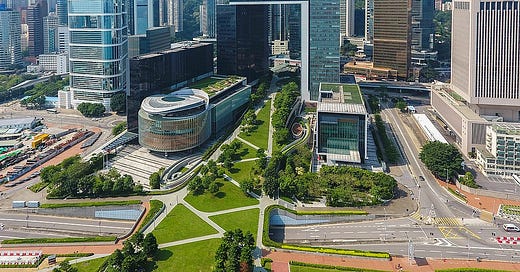By: Tim Hamlett
Well, you have to say one thing about Hong Kong's way of choosing a new chief executive: it's quick. Nominations opened on Sunday and it is already all over. Barring some serious accident or illness, the next CE will be the current Chief Secretary, John Lee Ka-chiu.
Since the election “reforms” imposed unilaterally by Beijing last year, the CE is “elected” by an Election Committee. This is a revamped version of the old system, in which the Election Committee was formed through a variety of elections and ex officio members.
The revised version has been purged of unreliable elements. There are now five sectors, each with 300 members. One of them consists entirely of nominees of the Beijing or Hong Kong governments. Anyone wishing to run must obtain 188 nominations, including at least 15 members from each sector.
This is, and was intended to be, a system open to manipulation by the local representatives of the Beijing government, and indeed no effort has been made to conceal the workings of the system. Lee's expression of his intention to resign from his present post and run for Chief Executive was closely followed by a meeting at the Liaison Office (China's de facto imperial HQ in Hong Kong) attended by selected Election Committee bigwigs, who all emerged lauding Mr. Lee's many virtues and pledging to vote for him.
Sources say that Lee will be the only candidate supported by Beijing, and the “election” will follow along the same lines as the last chief executive election in Macau, where there was only one candidate. This arrangement used to be so common among Latin American military dictators that it is known in academic circles by its name in Spanish: candidatounico.
Lee has an unusual background for a senior Hong Kong civil servant. His main career was in the police force, in which he rose to the rank of assistant police commissioner. In 2012, on the brink of retirement, he left the force to become undersecretary for security. Five years later he became the secretary for security. He was promoted again, to chief secretary, in June of last year.
As secretary for security, Lee displayed the sort of willingness to flout the wishes of the public if they conflicted with those of his superiors, which goes down well with the Liaison Office talent spotters.
He pushed through the location of mainland customs and immigration officers in the Kowloon terminus of the new express rail link. He closed the (allegedly pro-independence) Hong Kong National Party and was in charge both of the fugitive bill which sparked the 2019 protests, and of the fierce policing which turned them into a wider movement.
He has proceeded to close newspapers and preside over the arrests of politicians, undeterred by his appearance on the list of Hong Kong officials sanctioned by overseas governments for their role in curtailing the city's freedoms.
Previous occupants of the chief executive's office have found that their initial popularity waned as their terms went on. Lee will be spared this worry. With this history the only place left for his popularity to go is up.
Some discreet misgivings have been expressed about his suitability for the job. Soon after his appointment as chief secretary the then chief exec, Carrie Lam, said that she knew he did not know much about matters outside the security specialty and she would help out with “the other stuff.” This is now rather implausibly characterized as a joke. Lam rarely jokes.
Hong Kong's senior civil servants have generally come from what is called the Administrative Officer (AO) grade. These are people recruited as fresh graduates and put through a sort of “officer factory” process intended to produce generalist experts in administration as a separate skill.
Two of Hong Kong's first four chief executives came from this process. Two were from a business background. None of them was terribly successful and none of them so far, including Lam, managed to serve two full terms.
Lately, there has been some muttering in pro-Beijing circles that the AO grade forms a sort of inner circle in the civil service, passively resisting initiatives they disapprove of. Lee can no doubt be trusted to follow orders. But running a police force is not like running a civil service. Actually running the Hong Kong Police Force is not much like running a police force either, it is more like running an army. Still...
Lee is now reported to be assembling a “campaign team” which will work on his election prospects. It will apparently concentrate on election committee members in the early stages, and move on to the general public later. This is an empty ritual. Lee will have no serious opposition and would face no real prospect of defeat if he had. The general public has no say in the matter anyway.
Still, it will be interesting to watch Lee's effort to turn himself into a political figure. People who have worked with him on a face-to-face basis say he is tolerant and willing to listen to different views. This is not a quality which he has displayed in public.
He might also work a bit on the humorless persona. Lee may for all we know be a star turn in the Hong Kong Police Stand-up Comedy Club but in his official appearances, he looks like someone who fears that part of his face will fall off if he cracks a smile.



